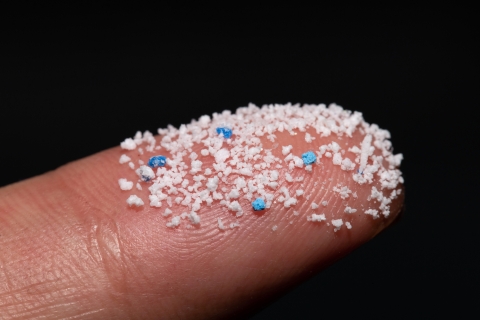
Researchers from the University of Portsmouth are aiming to develop solutions to limit the harmful effects of microplastics on the environment and human health.
Scientists know that the amount of microplastics being released into our environment is increasing, with a pressing need to understand what the impact on human health will be. This is where the University’s new Microplastics Research Group is hoping to make a difference.
Most microplastics in the environment occur when plastics break down or are shed from man-made materials, breaking down into smaller and smaller pieces. Microplastics are defined as any plastic below 5mm in size. Some are even smaller and invisible to the naked eye. Airborne microplastics, for example, are 1/70th of the width of the average human hair and we can inadvertently breathe them into our lungs.
Aside from the environmental damage caused by plastics, there is growing concern about what inhaling and ingesting microplastics is doing to our bodies.
Dr Fay Couceiro, Reader of Biogeochemisty and Environmental Pollution and Microplastics Research Group lead
Microplastics are found everywhere. They have been discovered in every place on earth that has been sampled so far. It is not just cities that are affected. Microplastics have been found in remote mountain ranges, the arctic and even sea spray.
Dr Fay Couceiro, Reader of Biogeochemisty and Environmental Pollution and Microplastics Research Group lead said: “Our new research group will study the impact of microplastics in all environments — including soil, air, water and biota. It will also examine their secondary impacts on plant, animal and human health. Most importantly our research is focused on identifying solutions to limit the impact of microplastics.”
One of the first projects to be carried out is with Portsmouth Hospitals University NHS Trust. It will investigate the presence of microplastics in the lungs of patients with chronic obstructive pulmonary disease (COPD) and asthma. It is hoped the research may alert patients of risks or triggers for their condition, such as recently carpeted or hoovered rooms that may have a high number of fibres in the air.
We intend to conduct further research at the University of Portsmouth to discover more about how microplastics enter the human body and what their impact might be on our health.
Dr Fay Couceiro, Reader of Biogeochemisty and Environmental Pollution and Microplastics Research Group lead
Dr Couceiro says, “Aside from the environmental damage caused by plastics, there is growing concern about what inhaling and ingesting microplastics is doing to our bodies. We intend to conduct further research at the University of Portsmouth to discover more about how microplastics enter the human body and what their impact might be on our health.”
Most studies that examine microplastics are undertaken outdoors. In the UK, however, 90 per cent of our time is spent indoors. Most of the air we breathe is therefore indoor air, yet very little research has taken place on microplastics in this type of environment.
As part of the University’s Revolution Plastics initiative, Dr Coucerio recently undertook research into microplastics indoors to examine the amount of microfibres in the air inside a typical family home and what happens when we wash synthetic clothes. The study, with Good Morning Britain, found that some people are breathing in between 2,000–7,000 microplastics per day.
The issue of microplastic fibres being shed from our clothes during washing has recently been raised in a private members bill in the UK Parliament and will be debated tomorrow (21 January). Alberto Costa MP has cited research carried out by the University of Portsmouth in his bill. He is pushing for the UK government to follow in the footsteps of France, which has legislated for all new washing machines to have microplastic fibre filters fitted by 2025. The filters would prevent plastic fibres from entering water streams.
